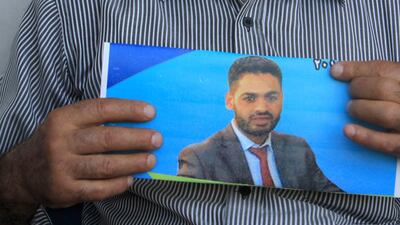JERUSALEM // A Palestinian who spent 65 days on hunger strike in protest at being imprisoned without trial was back in an Israeli jail yesterday after being discharged from hospital.
Mohammed Allan, a lawyer and member of the Islamic Jihad militant group, renewed his hunger strike following his detention yesterday.
“He is starting his protest – no food, no medicine, everything,” his cousin Nader Allan said.
Mr Allan, 31, has been a thorn in Israel’s side since he was arrested in November last year, and imprisoned without being charged or tried.
His case focused attention on what Israel calls “administrative detention”, which allows a military court to order people to be jailed indefinitely, subject to renewal every six months by the court.
More than 5,000 Palestinians are being held without trial in Israeli prisons. The system has drawn international condemnation and has been challenged repeatedly by human rights groups in Israeli courts.
Israeli authorities claim that Mr Allan is involved in terrorism, but they say prosecuting him would risk revealing national security secrets in court. Mr Allan denies the accusation, and has demanded that Israel either charge him or release him.
He went on hunger strike in June, and lost consciousness after 60 days. The previous day, Israel had offered to release him if he lived in exile for four years, which his lawyers rejected.
At one point the Israelis considered using a law passed in July that allows them to force-feed a hunger striker. But Israeli doctors are vehemently opposed to the law, and none could be found to carry out the medical tests required to put it into action.
Last month the Israeli supreme court suspended the detention order and Mr Allan had been receiving treatment at a hospital in Ashkelon. After his discharge yesterday an Israeli police spokeswoman said the order was reactivated and he would return to prison.
Mr Allan’s detention order expires on November 3. It is not known if authorities will ask for it to be renewed.
* Reuters

